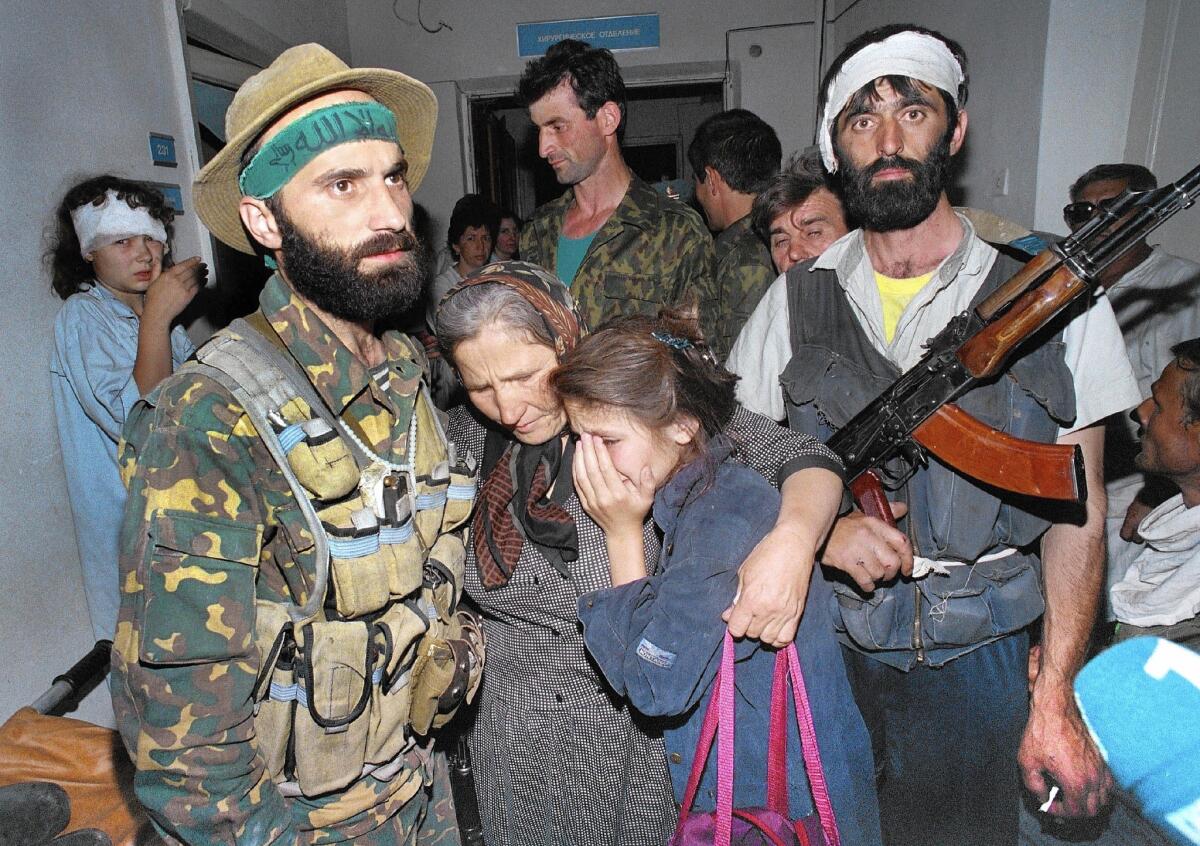War crimes prosecutions are rare in cases of hospital bombings

- Share via
Red crosses painted on the roofs of hospitals are supposed to protect the facilities and their patients from the ravages of war under the Geneva Conventions that have sought for decades to impose humanitarian order amid armed conflict.
But across the global spectrum, especially in the lawless and nonstate insurgencies of recent years, combatants have ignored the prohibition against bombing hospitals and justified their attacks — if they acknowledged them at all — as strikes against enemies firing from within the protected venues.
Hospitals have been bombed and patients and medical personnel killed and wounded in virtually every conflict to shatter the post-World War II peace: Sarajevo, Gaza, Chechnya, Burundi and, last weekend, Kunduz, Afghanistan.
The Kunduz airstrike Saturday by American forces killed 22 people at the Doctors Without Borders hospital in the northern Afghan city. The medical charity’s general director, Christopher Stokes, accused U.S. military officials of committing “a war crime.” The U.S. military said Monday that Afghan forces, not U.S. advisors, had initiated a request for an airstrike.
In fact, complaints of illegal action lodged by international relief agencies and human rights groups have seldom resulted in prosecution of those accused of ignoring the international community’s agreement to respect the treatment of the sick and wounded.
What law defines attacks on hospitals as a war crime?
The 1949 Fourth Geneva Convention’s “Protection of Civilian Persons in Time of War” prohibits combatants from targeting hospitals, as well as facilities dedicated to religion, art, science and charitable purposes.
The treaty, signed by 196 nations, requires that the facilities identify themselves with the internationally recognized symbol of a red cross on a white field, either on the building’s roof or flagpole.
It defines facilities deserving of protection as those with “the ability to give care to the sick on a permanent basis.”
Although violators of the protective designation often seek to justify their actions as provoked by their opponents, the law doesn’t recognize exceptions.
Why do violators often escape justice?
The “fog of war” obscures the circumstances of attacks on Geneva-protected institutions, leaving little reliable evidence on which to base prosecutions.
Most allegations of targeting hospitals don’t advance beyond angry denunciations after the attacks. The bureaucracy of the U.N. institutions charged with investigating war crime allegations and the glacial pace of international justice often ensure that the cases never make it to trial.
The International Criminal Court in The Hague went into force in 2002, so its mandate to end impunity for war crimes doesn’t apply to violations committed before then. That has compelled the United Nations to establish special courts with more limited mandates to prosecute war crimes involving the former Yugoslavia, Rwanda, Sierra Leone, Lebanon, Cambodia and East Timor.
Institutional obstacles also tend to thwart the pursuit of justice even when human rights and justice authorities can amass a convincing case. The veto power of the five permanent members of the U.N. Security Council — the United States, Russia, China, Britain and France — has been used to scuttle investigation into allegations against member countries or allied nations.
The reality of “victors’ justice” also allows the complaints of the vanquished to be ignored. Wayward NATO airstrikes in Yugoslavia in 1999 killed dozens of ethnic Albanian refugees fleeing Kosovo, struck two hospitals in Serbia and inflicted massive damage to the Chinese Embassy in Belgrade. An investigation by a committee established by the International Criminal Tribunal for the Former Yugoslavia concluded more than seven years later that “investigations are unlikely to result in the acquisition of sufficient evidence to substantiate charges.”
Where have attacks on hospitals occurred and gone unpunished?
U.N. peacekeepers deployed in Bosnia-Herzegovina during the early 1990s reported multiple artillery attacks on Sarajevo’s Kosevo Hospital. All sides in the conflict that ended in the 1995 Dayton peace accords each accused the others of using hospitals and other protected facilities to shelter armed fighters.
In Russia’s Chechnya republic, Islamist rebels fought two wars with the Kremlin’s armed forces and staged some of their most brutal attacks at hospitals and schools. In June 1995, the Chechen fighters seized hundreds of hostages at a hospital in the southern Russian town of Budennovsk. They used maternity ward patients as human shields as they fired on Russian troops who made a failed attempt to end the siege. More than 100 died in the shootout, most of them civilians.
Palestinians have repeatedly accused Israeli forces of violating the law protecting hospitals in the clashes that have racked the region for decades. In the latest major battle, the 50-day war in the summer of 2014, the Palestinians accused the Israel Defense Forces of targeting protected civilian facilities, including hospitals. The Israeli government blamed the violations on Palestinians shooting from within the protected sites. More than 2,000 Palestinians, many of them civilians, died in the war, along with six civilians and 67 soldiers on the Israeli side.
Attacks on medical facilities were reported in dozens of conflicts around the globe but were often overshadowed by more shocking brutalities, including more than 1,000 summary executions during the 1952-60 British colonial battle against the Mau Mau uprising in Kenya, more than 70,000 Muslim civilians killed in Algeria’s 1954-62 war for independence from France and the chemical attacks and civilian massacre at My Lai during the 1954-75 U.S. intervention in Vietnam.
What prosecutions have been undertaken in incidents in which hospitals were targeted?
The indictment of former Yugoslav President Slobodan Milosevic was one of the rare instances of a senior figure being called to account for disregard of the hospital protections, among other war crimes charges. Milosevic, however, died of a heart attack in his cell at the war crimes tribunal on March 11, 2006.
More to Read
Sign up for Essential California
The most important California stories and recommendations in your inbox every morning.
You may occasionally receive promotional content from the Los Angeles Times.













